Tentative truce shows China’s influence – and its limits – in Myanmar
Close to the generals and ethnic armed groups who began a major offensive in October, Beijing brought both to the table, but fighting continues.
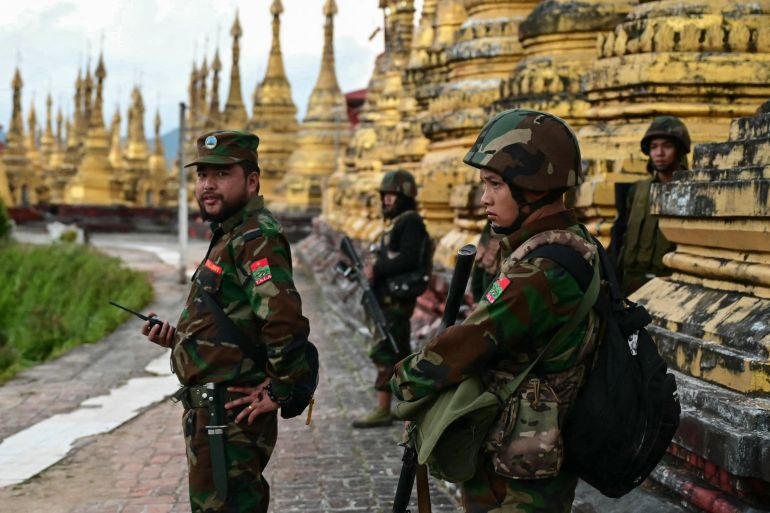
Bangkok/Taipei – China has emerged as the dominant foreign power in terms of shaping possible outcomes in Myanmar’s spiralling political crisis as Beijing seeks to exert its influence over several armed groups who have staged the biggest challenge to the generals since they seized power in the February 2021 coup.
Beijing last week pushed the three powerful ethnic armies – the Arakan Army (AA), the Mandarin-speaking Myanmar National Democratic Alliance Army (MNDAA) and the Ta’ang National Liberation Army (TNLA) – to agree to a truce after fighters working with anti-coup coalitions across Myanmar pushed Senior General Min Aung Hlaing’s military out of swathes of the north, overran hundreds of military outposts and seized control of border crossings with China under Operation 1027.
Keep reading
list of 4 itemsMyanmar now world’s top opium producer, surpassing Afghanistan: UN
Hundreds of Thais trapped by clashes in northern Myanmar being evacuated
European nations join Myanmar genocide case
China’s ceasefire announcement followed talks in its southwestern city of Kunming between the State Administration Council (SAC), as Myanmar’s coup leaders call themselves, and the Three Brotherhood Alliance, the coalition of the AA, MNDAA and TNLA, which is driving the 1027 offensive.
“China supports the peace process of northern Myanmar and has provided support and facilitation for dialogue and contact between relevant parties in Myanmar,” Chinese Foreign Ministry spokesperson Mao Ning said in a statement on December 14, confirming that “a temporary ceasefire” had been reached.
Beijing’s prominent involvement in the truce and its armed support for both ethnic armies and the SAC makes China by far the most influential foreign actor in the turmoil in Myanmar, a strategic location where big powers have long jostled for influence and whose generals are also deepening ties with Russia.
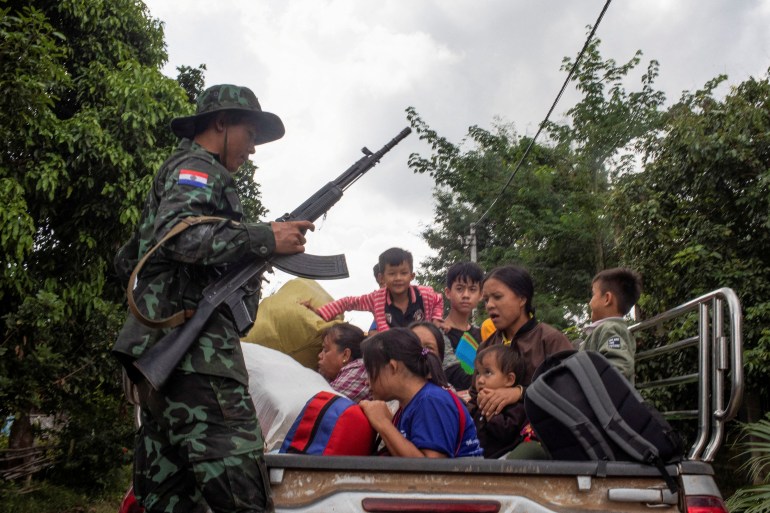
The SAC Foreign Minister Than Swe was in Beijing at the beginning of December.
“The truce followed the junta foreign minister’s visit to Beijing where he pleaded for China’s assistance, and a flurry of Chinese government interactions with the MNDAA and its allies,” said Jason Tower, Myanmar country director at the United States Institute of Peace.
Patronage networks
The ceasefire also came days after Beijing issued arrest warrants for 10 partners and cronies of Myanmar’s military, including members of the five powerful families who collectively ruled Kokang, bordering China’s Yunnan Province. The most notable target was Bai Suocheng, a key ally of Min Aung Hlaing, an indication of the complex layers of connections and patronage between China, Myanmar’s ethnic minorities in the borderlands and the generals.
“China is really pi**ed off with the regime for the scam centres and related crime. Myanmar became synonymous with scams in China,” a source close to the Chinese government told Al Jazeera.
“The SAC underestimated how enraged Beijing is with the waves of Chinese nationals caught in the border,” the source added.
While Operation 1027 represents the most serious challenge to military rule since Min Aung Hlaing’s coup, it has taken place amid a surge in drug and human trafficking in lawless border areas, which has been felt elsewhere in the region.
Since the coup, and with Myanmar increasingly isolated by international sanctions and excluded by many of its traditional partners in Southeast Asia, the generals have moved closer to Beijing, which has snubbed the National Unity Government (NUG) – a parallel administration established by elected lawmakers, primarily from the National League for Democracy, who were removed in the coup. The NUG established the People’s Defence Forces (PDFs), armed groups made up of civilians opposed to the coup and training and fighting alongside ethnic armed organisations.
All eyes are now on the MNDAA, the de facto leader of the 1027 offensive. It was founded by Peng Jiasheng, the strongman who ruled Kokang before being overthrown by Min Aung Hlaing and Bai Suocheng in 2009 and who died last year.
Tower said the offensive’s apparent breakthrough and the unprecedented level of cooperation across Myanmar’s resistance forces, including fighters from Myanmar’s dominant ethnic Bamar, was likely to make it “extremely problematic” for the group to agree to any kind of pact with the military leadership.
“Ethnic armies in northern Shan State, including the MNDAA, have relied heavily on people’s resistance forces across Shan and central Myanmar’s Mandalay, to achieve this battlefield success,” he said. “As such, any deal with the junta will result in major costs for the MNDAA in terms of its relationships and commitments to its partners.”
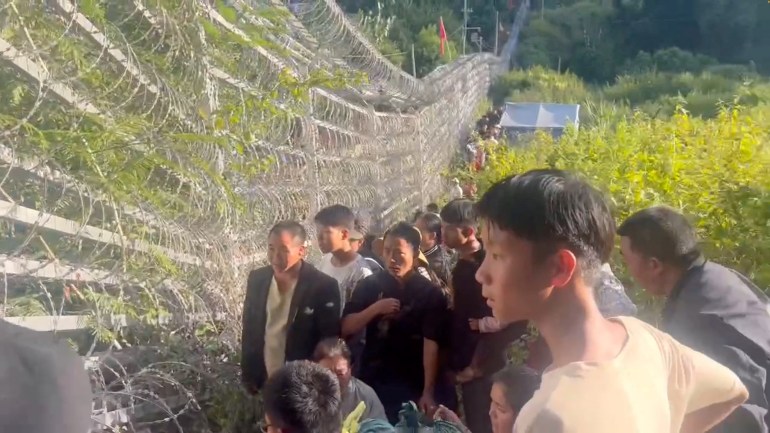
PDFs in Mandalay have taken a direct part in the offensive, holding and cutting off trade routes to deny the SAC the ability to resupply itself and provide logistical support against the MNDAA, which has trained an entire brigade of non-Chinese-speaking troops.
Beijing’s dramatic turn against members of the so-called “four families” – the Bai, Wei and two Liu families – in Kokang came after they were allowed to control the region with China’s blessings for more than a decade. The Ming family rose to prominence more recently.
Pro-China news website HK01 said the families collectively “formed industrial chains of pornography, gambling, drugs, and fraud”.
“Whether the black industries of several major families that have been entrenched in Kokang for many years can be eradicated amidst China’s vigorous crackdown on electronic fraud crimes and the war in northern Myanmar has become a major focus of attention from the outside world,” said HK01, which is owned by a China-linked investment firm.
In recent weeks China has drastically changed its narrative on the Kokang leaders. By December, the five families were being chastised publicly and placed under arrest. Ming Xue-chang, the leader of the Ming family who has been accused of leading a cybercrime syndicate, reportedly died by suicide last month while in detention.
Yangon-based Chinese-language magazine Golden Phoenix, a staunch mouthpiece of China, has echoed the change in narrative, running the headline, “Is the annihilation of the four big families imminent?”
“China is fully capable of vetoing any action taken by the MNDAA. The Tatmadaw knows this,” said a Chinese academic in Yangon who declined to be named due to the sensitivity of the matter. The Myanmar military is sometimes known as the Tatmadaw.
“In May this year, then-Chinese Foreign Minister Qin Gang visited Myanmar. At that time, outside observers thought China had chosen to completely side with SAC. In fact, China was putting pressure on the SAC,” they told Al Jazeera.
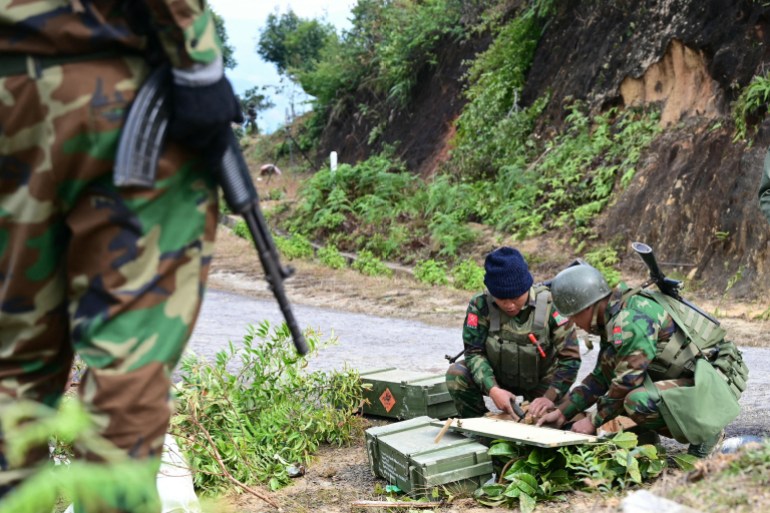
The source in Beijing said that now that the scam centres and criminals were largely dealt with, China’s priority would be border stability and that Beijing had not warmed up to the NUG, despite having previously developed a solid relationship with overthrown civilian leader Aung San Suu Kyi.
Fighting continues
The question is whether Beijing – which provides arms to the ethnic armies – will be able to effectively end the hostilities when resistance forces across Myanmar continue to fight, believing they have the momentum to make further gains.
Days after the ceasefire was signed, the TNLA said it had taken control of the town of Namhsan in northern Shan state as well as the so-called 105-Mile Trade Zone, a key trading area on Shan state’s border with China.
Security expert Anthony Davis pointed out that China’s role in logistical support reaching the ethnic armies, while largely indirect, was significant.
“The most important layer of plausible deniability centres on the role of the United Wa State Army (UWSA), which is entirely equipped with modern weaponry and equipment produced in China and at the same time, operates as an ally of, and quartermaster for, several northern ethnic factions, not least the Brotherhood Alliance,” Davis told Al Jazeera.
The UWSA – a formidable Chinese-speaking micro-state – has been providing support to the MNDAA in the recent offensive, including by hosting refugees fleeing the fighting.
“Given its powerful influence over the UWSA, China could undoubtedly affect a major reduction in munitions reaching northern groups if it wanted to. Clearly, it is not interested in taking steps to do that,” Davis said.
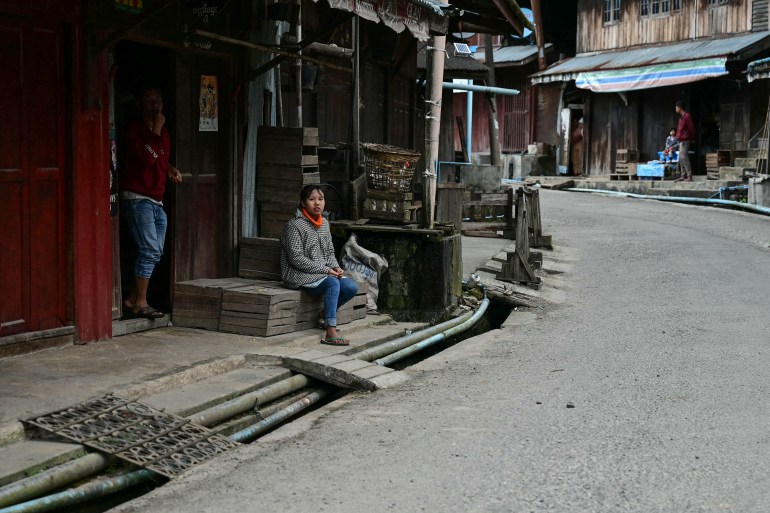
The NUG, meanwhile, says it is time for Beijing to recognise the damage being caused by the military and support a path towards democracy.
“The longer the generals stay in power, the greater they pose a serious threat to China because the SAC has repeatedly proven itself to be the source of all crimes in Myanmar,” the NUG’s International Cooperation Minister Dr Sasa told Al Jazeera in an interview.
“It is time for China to embrace the will of Myanmar’s people and support their sole representatives – the NUG – to end these threats and build a federal democracy which will provide peace, stability and prosperity for China, Myanmar and the region.”